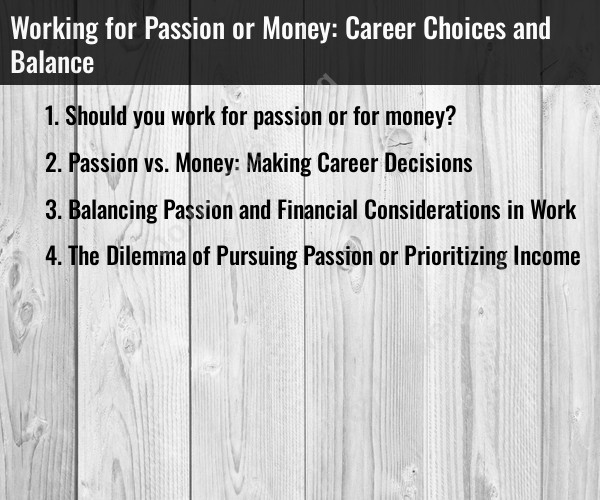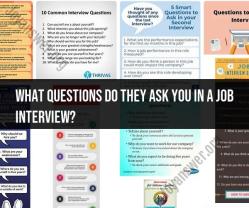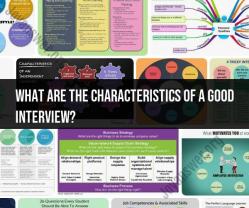Should you work for passion or for money?
The choice between working for passion or working for money is a complex and highly individual decision. There is no one-size-fits-all answer, and the best approach often lies in finding a balance between the two. Here are some considerations to help you make this decision:
Working for Passion:
Fulfillment and Happiness: When you work in a field you are passionate about, you are more likely to find deep satisfaction and happiness in your work. Passion can be a powerful motivator and can lead to a more fulfilling career.
Greater Resilience: Passion can provide you with the motivation to overcome challenges and setbacks in your career. When you truly care about what you do, you're more likely to persevere through difficult times.
Personal Growth: Pursuing your passion often leads to personal and professional growth. You may invest time and effort into honing your skills and knowledge, which can lead to long-term career success.
Increased Productivity: People tend to be more productive and creative when they are passionate about their work. This can lead to better job performance and potentially financial rewards down the line.
Working for Money:
Financial Stability: A job that offers a high salary or financial security can provide you and your family with a stable lifestyle and peace of mind. Financial stability can be a crucial consideration, especially if you have significant financial responsibilities.
Flexibility: A job that pays well may afford you more freedom to pursue your passions outside of work. You can use your financial resources to support your hobbies, interests, or side projects.
Career Progression: Some high-paying jobs come with opportunities for career advancement and professional development. You may be able to use a well-paying job as a stepping stone to a more fulfilling career later on.
Responsibilities: If you have significant financial responsibilities, such as debt or the support of dependents, prioritizing money in your career choices may be necessary to meet these obligations.
Finding Balance:Finding a balance between passion and money is often the ideal approach. Here are some tips for achieving this balance:
Side Hustles and Hobbies: You can pursue your passion through side hustles, hobbies, or volunteer work while maintaining a stable, well-paying job to meet your financial needs.
Exploration: Consider exploring career paths that align with your interests and values, even if they may not initially offer the highest salary. Over time, you can work toward a career that combines both passion and financial stability.
Financial Planning: Be sure to plan your finances wisely, save for the future, and manage debt effectively, regardless of whether you prioritize passion or money.
Periodic Reevaluation: Periodically assess your career choices and adjust your priorities as your life circumstances change. What may be most important to you at one stage of your life may shift over time.
Ultimately, the decision to work for passion or money should be based on your individual goals, values, and circumstances. There is no right or wrong choice, and what matters most is that you find a path that brings you a sense of fulfillment and meets your financial needs, whether that's through passion, money, or a combination of both.
Passion vs. Money: Making Career Decisions
One of the biggest decisions we make in life is what career to pursue. It's a decision that can have a significant impact on our happiness, fulfillment, and financial well-being.
Many people believe that it's important to choose a career that they're passionate about. When we're passionate about our work, we're more likely to be engaged and motivated. We're also more likely to be successful, because we're willing to put in the extra effort to learn and grow.
However, it's also important to consider financial considerations when choosing a career. Some careers simply pay more than others. And if we have financial obligations, such as a mortgage or a family to support, we may need to choose a career that pays well, even if it's not our ideal job.
So, how do we balance passion and money when making career decisions? Here are a few tips:
- Identify your passions: What are you interested in? What do you enjoy doing? Make a list of your passions and then start to research careers that align with them.
- Consider your financial needs: How much money do you need to earn to support yourself and your family? How much debt do you have? Be realistic about your financial needs when choosing a career.
- Talk to people in different fields: Talk to people who work in careers that you're interested in. Ask them about their work, what they like and dislike about it, and how much they earn.
- Do your research: Research different careers to learn about the job requirements, education and training needed, and salary potential.
- Don't be afraid to compromise: It may not be possible to find a career that perfectly aligns with your passions and financial needs. Be willing to compromise on one or the other.
Balancing Passion and Financial Considerations in Work
Once you've chosen a career, it's important to find a way to balance your passion and financial considerations. Here are a few tips:
- Set realistic expectations: Don't expect to start out at the top of your field and earn a high salary. It takes time to build experience and expertise.
- Be willing to work hard: If you're passionate about your work, you'll be more likely to work hard and put in the extra effort. This will help you to advance in your career and earn a higher salary.
- Find ways to supplement your income: If you're not earning as much money as you'd like in your current job, consider finding ways to supplement your income. This could involve freelancing, starting a side hustle, or teaching classes.
- Be patient: It takes time to build a successful career. Don't get discouraged if you don't achieve your goals overnight. Just keep working hard and learning, and you'll eventually reach your goals.
The Dilemma of Pursuing Passion or Prioritizing Income
Pursuing passion or prioritizing income can be a difficult dilemma. There is no right or wrong answer, as the best decision will vary depending on individual circumstances.
Here are some things to consider when making this decision:
- Financial stability: How important is financial stability to you? If you have a family to support or other financial obligations, you may need to prioritize income over passion.
- Your personal values: What is most important to you in a career? Do you value money, prestige, or personal fulfillment the most?
- Your risk tolerance: How willing are you to take risks? Pursuing a passion-based career can be risky, as it may not guarantee financial success.
If you are struggling to decide whether to pursue passion or prioritize income, it may be helpful to talk to a career counselor or financial advisor. They can help you to assess your individual circumstances and make the best decision for you.
Ultimately, the decision of whether to pursue passion or prioritize income is a personal one. There is no right or wrong answer, and the best decision will vary depending on individual circumstances.













